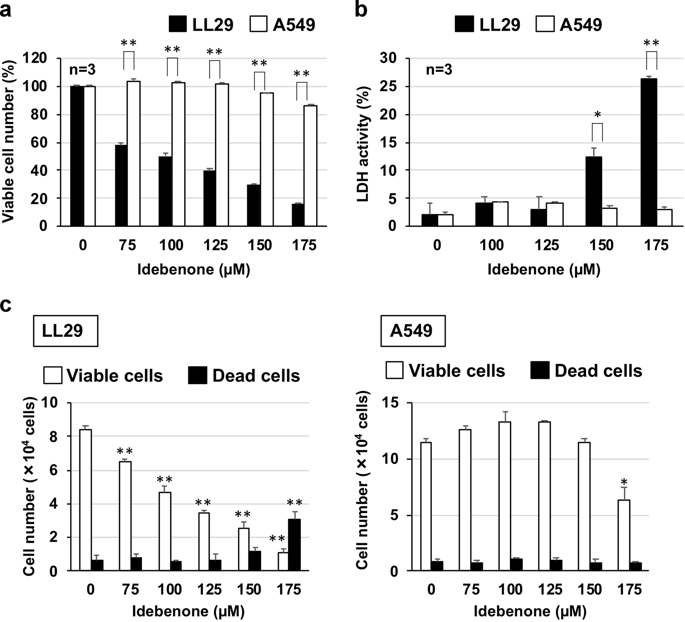Cell Death Discovery ( IF 6.1 ) Pub Date : 2019-11-18 , DOI: 10.1038/s41420-019-0226-y Toshifumi Sugizaki , Ken-ichiro Tanaka , Teita Asano , Daisuke Kobayashi , Yuuki Hino , Ayaka Takafuji , Mikako Shimoda , Kaoru Mogushi , Masahiro Kawahara , Tohru Mizushima

|
Alveolar epithelial injury induced by reactive oxygen species (ROS) and abnormal collagen production by activated fibroblasts (myofibroblasts) is involved in the onset and exacerbation of idiopathic pulmonary fibrosis (IPF). Compared with alveolar epithelial cells, lung fibroblasts, especially myofibroblasts, exhibit an apoptosis-resistance phenotype (apoptosis paradox) that appears to be involved in IPF pathogenesis. Thus, we screened for chemicals eliciting preferential cytotoxicity of LL29 cells (lung fibroblasts from an IPF patient) compared with A549 cells (human lung alveolar epithelial cell line) from medicines already in clinical use. We identified idebenone, a synthetic analogue of coenzyme Q10 (CoQ10, an antioxidant) that has been used clinically as a brain metabolic stimulant. Idebenone induced cell growth inhibition and cell death in LL29 cells at a lower concentration than in A549 cells, a feature that was not observed for other antioxidant molecules (such as CoQ10) and two IPF drugs (pirfenidone and nintedanib). Administration of idebenone prevented bleomycin-induced pulmonary fibrosis and increased pulmonary ROS levels. Importantly, idebenone also improved pulmonary fibrosis and lung function when administered after the development of fibrosis, whereas administration of CoQ10 similarly prevented bleomycin-induced pulmonary fibrosis, but had no effect after its development. Administration of idebenone, but not CoQ10, suppressed bleomycin-induced increases in lung myofibroblasts. In vitro, treatment of LL29 cells with idebenone, but not CoQ10, suppressed TGF-β–induced collagen production. These results suggest that in addition to antioxidant activity, idebenone exerts inhibitory activity on the function of lung fibroblasts, with the former activity being preventative and the latter therapeutic for bleomycin-induced fibrosis. Thus, we propose that idebenone may be more therapeutically beneficial for IPF patients than current treatments.
中文翻译:

艾地苯醌通过优先抑制成纤维细胞活性对肺纤维化具有预防和治疗作用
活性氧(ROS)引起的肺泡上皮损伤和活化成纤维细胞(肌成纤维细胞)异常产生胶原蛋白参与了特发性肺纤维化(IPF)的发作和加重。与肺泡上皮细胞相比,肺成纤维细胞,尤其是成肌纤维细胞,表现出凋亡抗性表型(凋亡悖论),似乎与IPF发病机制有关。因此,我们从临床已经使用的药物中筛选了与A549细胞(人肺泡上皮细胞系)相比,能引起LL29细胞(来自IPF患者的肺成纤维细胞)发生优先细胞毒性的化学物质。我们鉴定了艾地苯醌,辅酶Q10(CoQ 10的合成类似物,一种抗氧化剂)已在临床上用作脑部代谢刺激剂。艾地苯醌以低于A549细胞的浓度诱导LL29细胞的细胞生长抑制和细胞死亡,这是其他抗氧化剂分子(例如CoQ 10)和两种IPF药物(吡非尼酮和nintedanib)所没有观察到的特征。艾地苯醌的使用可预防博来霉素诱导的肺纤维化和增加肺ROS水平。重要的是,在纤维化发生后给予艾地苯醌还可以改善肺纤维化和肺功能,而给予辅酶Q 10同样可以预防博来霉素诱导的肺纤维化,但在其发展后没有任何作用。施用艾地苯醌,但不进行辅酶Q 10抑制博来霉素诱导的肺成纤维细胞增加。在体外,用艾地苯醌而不是辅酶Q 10处理LL29细胞可抑制TGF-β诱导的胶原蛋白生成。这些结果表明,除了抗氧化剂活性外,艾地苯醌还对肺成纤维细胞的功能发挥抑制作用,前者是预防性的,后者是对博来霉素诱导的纤维化的治疗性。因此,我们建议艾地苯醌对IPF患者的治疗可能比目前的治疗更为有益。










































 京公网安备 11010802027423号
京公网安备 11010802027423号